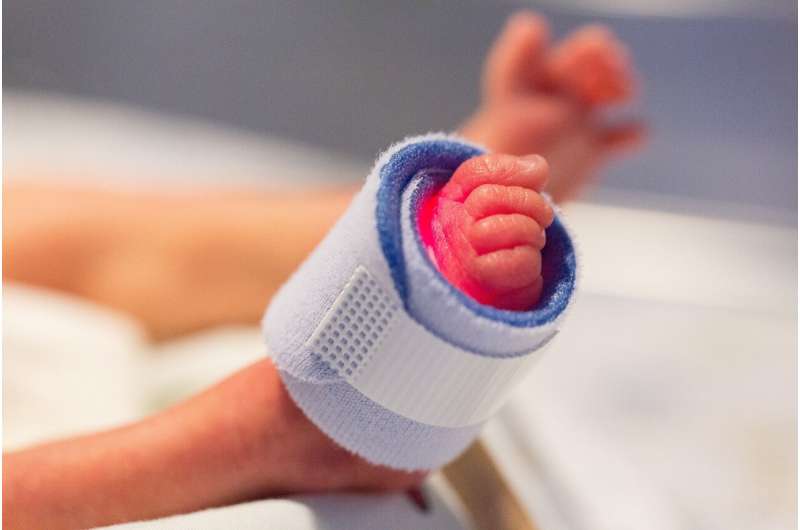This article has been reviewed according to Science X's editorial process and policies. Editors have highlighted the following attributes while ensuring the content's credibility:
fact-checked
trusted source
proofread
Study finds long-term outcomes of neonatal listeriosis are mainly due to prematurity rather than infection

Maternal-fetal listeriosis is a severe disease that can lead to miscarriage, premature birth or serious neonatal infection. But what are the long-term consequences of neonatal listeriosis on the health of surviving infants?
For the first time, a team of scientists and physicians from the Institut Pasteur, Université Paris Cité, the Paris Public Hospital Network (AP-HP), and Inserm monitored the development of children infected with the bacterium Listeria monocytogenes up to the age of 5 and compared their development with that of uninfected gestational age-matched children.
The study showed that the long-term outcomes of neonatal listeriosis were mainly due to prematurity. The results, published in the journal The Lancet Child & Adolescent Health, will allow parents to be better informed about how the health of their children may develop and help anticipate the potential onset of neurodevelopmental sequelae.
Pregnant women today are all too aware of the risk of acquiring listeriosis, a foodborne infection, during pregnancy, and they are advised to avoid unpasteurized cheeses, cold meats, and ready-to-eat foods that have not been thoroughly reheated. And with good reason, as the consequences can be severe: the bacterium Listeria monocytogenes can lead to miscarriage, premature birth, and/or serious infection in newborn babies (septicemia or lung/neurological infection).
In France, around 40 newborn babies are affected each year.
"Since 2009, we have been studying all the strains of Listeria and all listeriosis patients in France—since listeriosis is a notifiable disease—to elucidate the characteristics of the disease. One of our questions was how infants with neonatal listeriosis, who have recovered after antibiotic treatment, go on to grow and develop," explains Marc Lecuit, Head of the National Reference Center for Listeria and the Biology of Infection Unit (Institut Pasteur/Université Paris Cité/Inserm), Professor of Infectious Diseases at Université Paris Cité and Necker-Enfants Malades Hospital, and co-last author of the study.
The team of scientists and physicians used the French MONALISA cohort, which recruits all confirmed cases of listeriosis, to study the long-term neurological and neurodevelopmental consequences of infection in surviving children. This in-depth follow-up made possible thanks to the active participation of the children's families, provided an unprecedented picture of the consequences of neonatal listeriosis on the neurocognitive development of children at a key age when they are entering primary school.
The multidisciplinary team, consisting of infectious disease experts, pediatricians, neuropsychologists, and epidemiologists, followed about 50 children born to mothers who had contracted listeriosis at different stages of pregnancy and conducted a comprehensive health assessment at age 5.
Cognitive development was assessed using the French version of the Wechsler Preschool and Primary Scale of Intelligence, and motor and visual development was assessed using a physical examination designed to screen for cerebral palsy and developmental coordination disorder. Parental interviews and clinical tests were also used to assess hearing, functional communication, and socialization.
The results obtained were compared with those of uninfected gestational age-matched children from two large contemporary national cohorts: EPIPAGE-2 (preterm infants) and ELFE (term infants).
This comparative approach revealed that two-thirds of infants born with listeriosis had sequelae (cognitive dysfunction, motor coordination problems, visual or hearing impairment) at age 5, mainly attributable to their prematurity.
"We can now confirm that the long-term outcomes of neonatal listeriosis are mainly a result of prematurity rather than infection. These results will enable clinicians to provide science-based guidance to parents of newborns with listeriosis and to inform them about the development of their child's health. They also support the implementation of systematic long-term screening for possible sequelae so that appropriate early treatment can be offered, together with tailored educational support," concludes Caroline Charlier, a scientist at the Biology of Infection Unit (Institut Pasteur/Université Paris Cité/Inserm), Professor of Infectious Diseases at Université Paris Cité and Cochin Hospital, and first author and coordinator of the study.
More information: Caroline Charlier et al, Long-term neurological and neurodevelopmental outcome of neonatal listeriosis in France: a prospective, matched, observational cohort study, The Lancet Child & Adolescent Health (2023). DOI: 10.1016/S2352-4642(23)00195-5


















